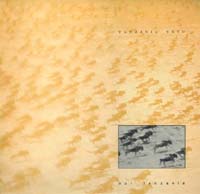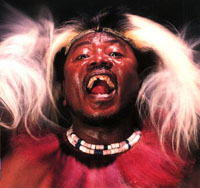Dr. Hukwe Zawose (1938-2003)
27. 6. 2011 | Rubriky: Articles,Lives
 [by Ken Hunt, Berlin] On 30 December 2003, Tanzania’s internationally best-known musician, Hukwe Zawose died at home in Bagamoyo, his musical base for many decades, at the age of 65. Tanzanian music never had much of an international profile outside of ethnography until Hukwe Zawose but when it arrived it arrived in style.
[by Ken Hunt, Berlin] On 30 December 2003, Tanzania’s internationally best-known musician, Hukwe Zawose died at home in Bagamoyo, his musical base for many decades, at the age of 65. Tanzanian music never had much of an international profile outside of ethnography until Hukwe Zawose but when it arrived it arrived in style.
 Born in 1938 in Doduma, a rural district in central Tanganyika, as it was then known, he had an active recording career outside his homeland, recording for Real World, the Tokyo-based Seven Seas/King Record Co, Triple Earth (the London-based label that brokered and oversaw his international breakthrough) and WOMAD Select (notably the Mkuki Wa Rocho (A Spear To The Soul) album, 2002). Even if most people never bothered to learn about Wagogo as opposed to Tanzanian culture, Zawose became the one name that people remembered when it came to Tanzania’s folkways or, cynically mumbled, its ‘World Music’.
Born in 1938 in Doduma, a rural district in central Tanganyika, as it was then known, he had an active recording career outside his homeland, recording for Real World, the Tokyo-based Seven Seas/King Record Co, Triple Earth (the London-based label that brokered and oversaw his international breakthrough) and WOMAD Select (notably the Mkuki Wa Rocho (A Spear To The Soul) album, 2002). Even if most people never bothered to learn about Wagogo as opposed to Tanzanian culture, Zawose became the one name that people remembered when it came to Tanzania’s folkways or, cynically mumbled, its ‘World Music’.
In 1961 the British granted Zawose’s homeland independence. In the spirit of President Julius Nyerere’s socialist-inspired Arusha Declaration of 1967, the nation extolled self-reliance and social equality. As a by-product of nurturing national and rural resources, as opposed to rubber-stamping international exploitation, Tanzanian culture thrived. Zawose was of an age and was sufficiently rooted in his home-culture for him to find a niche as a musician in the new state. His father had steeped him in the Wagogo people’s traditional folkways and had given him a grounding in several traditional instruments. These included the iseze family of stringed instruments encountered in a variety of strung and sized forms, and marimba and its diminutive form known as chirimba, a metal-tongued instrument plucked with the thumbs, hence the generic English-language name ‘thumb piano’. (Elsewhere in Africa the instrument is known variously as sanza, mbira, kalimba and so on.) Zawose also developed into a singer of gifted sensitivity with a vocal range that went from a natural speaking range to a throaty falsetto.
Tanzania’s economy affected domestic commercial recording activities. There was no real recording industry in any ‘developed nation’ sense. What was released was typical cassette fare. Iain Scott remembers that Zawose was first recorded privately by Tanzania’s future Minister for Sport and Culture, Godwin Z. Kaduma (though he only ever heard about these recordings by repute). As happened in the Eastern European bloc, Tanzania had nurtured folkloristic ensembles as expressions and emblems of pan-Tanzanian culture. These performed an acceptable brand of people’s art, often mixing and matching traditions and straddling the linguistic and cultural divides in the creation of a national sensibility (and unity). It was in two such ensembles that Zawose made his first impressions on the international consciousness. These were the Bagamoyo College of Arts – a pan-Tanzanian cultural troupe – and the Tanzanian National Dance Troupe – a typical socialist state, folkloristic ensemble.
What turned Zawose’s life around was his appearance at the 1984 Commonwealth Institute’s ‘Africa, Africa’ programme in London because Iain Scott was so moved by the Bagamoyo College of Arts that he arranged for them to go into a studio. They were recorded on an 8-track, one-inch machine. The sessions resulted in Tanzania Yetu (Our Tanzania) (1985), one of the greatest East African albums ever. It became the inaugural release on Scott’s visionary Triple Earth label, giving him the confidence to record his likewise inspired work with Najma Akhtar and Aster Awake. It was, as I have written elsewhere, the first step in Zawose’s colonisation of the non-African mind. Ultimately everything streamed from those Chiswick, West London sessions.
Zawose went from strength to strength, working round the world at festivals, for example, WOMAD’s Mersea Island festival in 1985, and recording. Triple Earth’s Mateso (1987), an album (bolstered on CD by some tracks from Tanzania Yetu), received strong airplay in Britain, although back then, as now, that was a tiny proportion of airtime. In Scott’s opinion, its fortunes were turned about by Charlie Gillett and Andy Kershaw playing tracks from it. Unfortunately, Tanzania Yetu has never received a CD reissue in its entirety – nothing added, just left alone – that it deserved.
Zawose contributed to Music of Tanzania (1987), one of the Tokyo-based Seven Seas/King Record Co’s extensive World Music Library volumes. Zawose worked hard and over the following years, he consolidated and built his reputation. After his breakthrough work with Triple Earth, he fell into the Real World orbit. He recorded Chibite (1995) and Assembly (2002), a collaboration with Canada’s Michael Brook. In 2002 his nephew Charles Zawose and he supported Peter Gabriel on his ‘Growing Up Tour’ and their collaborative composition Animal Nation appeared in the soundtrack to animated The Wild Thornberrys Movie (2002).